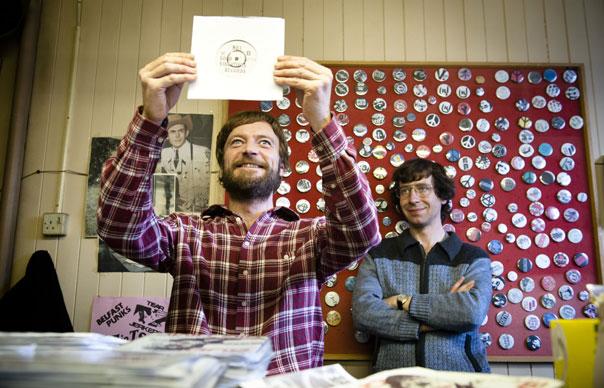There already exists a hefty body of work documenting the adventures of record label bosses from the punk era and beyond – but the accomplishments of Terri Hooley have so far been largely unrecorded. Hooley, a Belfast native, is a man with impressive rock credentials: he berated Bob Dylan for not withholding his taxes in protest at the Vietnam war (Dylan told him to “fuck off”), and on a visit to London found himself in a fight with John Lennon: “There was some talk of money being sent to the IRA and I chinned him. He hit me back,” Hooley said. In the mid-Seventies, Hooley opened a record shop, Good Vibrations, on Belfast’s Great Victoria Street and launched a sister label in 1978. While it’s fair to say that Hooley’s greatest musical success is Good Vibrations’ fourth single – “Teenage Kicks” by the Undertones – his broader achievements are perhaps harder to calculate. Both shop and label offered a valuable creative outlet for the city’s teenagers during the worst of the Troubles, with Hooley’s enthusiastic commitment to northern Ireland’s punk scene providing a powerful counter-argument to joining the paramilitaries. It’s this depiction of Belfast in the 1970s – commendably understated, but resonant throughout – that adds an extra level to Lisa Barros D’Sa and Glenn Leyburn’s film. For much of the time, Hooley’s tale is, while enjoyably ramshackle, a familiar one of skanky pubs, transit vans, snooty major label executives and poorly attended gigs. As befitting a label boss operating in the independent sector during the late Seventies, Hooley combines shameless self-promotion and committed idealism with woeful business acumen. A benefit gig is intended to raise funds for the shop and label, but Hooley’s generously proportioned guest list ensures it ends up making a loss. As Hooley, Richard Dormer is a lively, gangly mass of teeth and relentless optimism, dedicated to bringing “one love to the people of Belfast.” Michael Bonner
There already exists a hefty body of work documenting the adventures of record label bosses from the punk era and beyond – but the accomplishments of Terri Hooley have so far been largely unrecorded.
Hooley, a Belfast native, is a man with impressive rock credentials: he berated Bob Dylan for not withholding his taxes in protest at the Vietnam war (Dylan told him to “fuck off”), and on a visit to London found himself in a fight with John Lennon: “There was some talk of money being sent to the IRA and I chinned him. He hit me back,” Hooley said.
In the mid-Seventies, Hooley opened a record shop, Good Vibrations, on Belfast’s Great Victoria Street and launched a sister label in 1978. While it’s fair to say that Hooley’s greatest musical success is Good Vibrations’ fourth single – “Teenage Kicks” by the Undertones – his broader achievements are perhaps harder to calculate.
Both shop and label offered a valuable creative outlet for the city’s teenagers during the worst of the Troubles, with Hooley’s enthusiastic commitment to northern Ireland’s punk scene providing a powerful counter-argument to joining the paramilitaries. It’s this depiction of Belfast in the 1970s – commendably understated, but resonant throughout – that adds an extra level to Lisa Barros D’Sa and Glenn Leyburn’s film. For much of the time, Hooley’s tale is, while enjoyably ramshackle, a familiar one of skanky pubs, transit vans, snooty major label executives and poorly attended gigs.
As befitting a label boss operating in the independent sector during the late Seventies, Hooley combines shameless self-promotion and committed idealism with woeful business acumen. A benefit gig is intended to raise funds for the shop and label, but Hooley’s generously proportioned guest list ensures it ends up making a loss. As Hooley, Richard Dormer is a lively, gangly mass of teeth and relentless optimism, dedicated to bringing “one love to the people of Belfast.”
Michael Bonner



